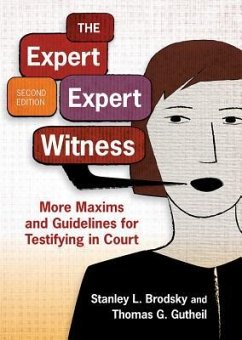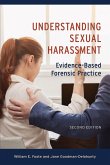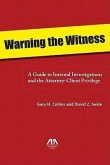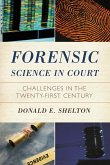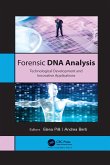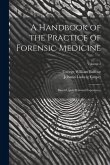Stanley L Brodsky, Thomas G Gutheil
The Expert Expert Witness
More Maxims and Guidelines for Testifying in Court
Schade – dieser Artikel ist leider ausverkauft. Sobald wir wissen, ob und wann der Artikel wieder verfügbar ist, informieren wir Sie an dieser Stelle.
Stanley L Brodsky, Thomas G Gutheil
The Expert Expert Witness
More Maxims and Guidelines for Testifying in Court
- Broschiertes Buch
- Merkliste
- Auf die Merkliste
- Bewerten Bewerten
- Teilen
- Produkt teilen
- Produkterinnerung
- Produkterinnerung
In this extensive revision of his classic guide, Stanley Brodsky, joined by coauthor Thomas Gutheil, continues to educate and entertain mental health professionals who are called as expert witnesses, teaching them simple, effective strategies for direct and cross-examination.
Andere Kunden interessierten sich auch für
![Understanding Sexual Harassment: Evidence-Based Forensic Practice Understanding Sexual Harassment: Evidence-Based Forensic Practice]() William E. FooteUnderstanding Sexual Harassment: Evidence-Based Forensic Practice64,99 €
William E. FooteUnderstanding Sexual Harassment: Evidence-Based Forensic Practice64,99 €![Warning the Witness: A Guide to Internal Investigations and the Attorney-Client Privelege Warning the Witness: A Guide to Internal Investigations and the Attorney-Client Privelege]() Gary CollinsWarning the Witness: A Guide to Internal Investigations and the Attorney-Client Privelege50,99 €
Gary CollinsWarning the Witness: A Guide to Internal Investigations and the Attorney-Client Privelege50,99 €![Forensic Science in Court Forensic Science in Court]() Donald SheltonForensic Science in Court56,99 €
Donald SheltonForensic Science in Court56,99 €![Forensic DNA Analysis Forensic DNA Analysis]() Forensic DNA Analysis109,99 €
Forensic DNA Analysis109,99 €![A Handbook of the Practice of Forensic Medicine: Based Upon Personal Experience; Volume 2 A Handbook of the Practice of Forensic Medicine: Based Upon Personal Experience; Volume 2]() Johann Ludwig CasperA Handbook of the Practice of Forensic Medicine: Based Upon Personal Experience; Volume 226,99 €
Johann Ludwig CasperA Handbook of the Practice of Forensic Medicine: Based Upon Personal Experience; Volume 226,99 €
In this extensive revision of his classic guide, Stanley Brodsky, joined by coauthor Thomas Gutheil, continues to educate and entertain mental health professionals who are called as expert witnesses, teaching them simple, effective strategies for direct and cross-examination.
Produktdetails
- Produktdetails
- Verlag: American Psychological Association (APA)
- 2nd edition
- Seitenzahl: 238
- Erscheinungstermin: 14. September 2015
- Englisch
- Abmessung: 231mm x 151mm x 17mm
- Gewicht: 355g
- ISBN-13: 9781433820557
- ISBN-10: 1433820552
- Artikelnr.: 43431178
- Herstellerkennzeichnung
- Libri GmbH
- Europaallee 1
- 36244 Bad Hersfeld
- gpsr@libri.de
- Verlag: American Psychological Association (APA)
- 2nd edition
- Seitenzahl: 238
- Erscheinungstermin: 14. September 2015
- Englisch
- Abmessung: 231mm x 151mm x 17mm
- Gewicht: 355g
- ISBN-13: 9781433820557
- ISBN-10: 1433820552
- Artikelnr.: 43431178
- Herstellerkennzeichnung
- Libri GmbH
- Europaallee 1
- 36244 Bad Hersfeld
- gpsr@libri.de
Stanley L. Brodsky and Thomas G. Gutheil
Preface
Introduction
1. Apologies
2. Arbitrary Pigeonholes
3. Asked and Answered
4. Boundaries Between Expert Witness Roles and Trial Consultation
5. Confabulations
6. Consistent Experts
7. Context
8. Directed Feedback
9. Discovery and Discoveries
10. Ethics in Expert Testimony
11. Evasive Responses: Hopeless But Not Serious
12. Experience Does Not Count
13. Expert Witness as Master Teacher
14. Fact Witnesses
15. Frames of Reference
16. Gender-Intrusive Questions
17. Gotcha and Goodbye
18. Holy Mackerel, Man!
19. Illusory Documentation
20. Integrity Checks
21. Language: It's a Virus
22. Lawyer Bashing and Lawyer Jokes
23. Le Mot Juste
24. Lost and Befuddled
25. Low Pitches
26. Metatestimony
27. Offensive Language
28. Offensive Questions
29. Personal Attacks: Overview
30. Personal Attacks: Demeaning Attorneys
31. Personal Attacks: Internet Vulnerabilities
32. Personal Attacks: Taints
33. Pulling and the Push–Pull
34. Real and Apparent Ambiguities
35. Recording of Assessments
36. Sayonara Solutions
37. Silent Treatments
38. Sleight of Hand
39. Social Construction of Posttraumatic Stress Disorder and
Dangerousness
40. Spontaneity and Alertness on the Stand
41. Swoop and Perch
42. Telephoned and Videorecorded Testimony
43. Thank You, Thank You, Thank You
44. Their Words in Our Mouths
45. Tightrope Walking
46. To Faint, To Weep, To Blank Out
47. Traps of Common Sense
48. True Grit and False
49. Ultimate Opinion Testimony
50. Well Beyond Testimony
51. What We Like to See in an Expert Witness — And What We Don't
Suggested Readings: More of This
References
Index
About the Authors
Introduction
1. Apologies
2. Arbitrary Pigeonholes
3. Asked and Answered
4. Boundaries Between Expert Witness Roles and Trial Consultation
5. Confabulations
6. Consistent Experts
7. Context
8. Directed Feedback
9. Discovery and Discoveries
10. Ethics in Expert Testimony
11. Evasive Responses: Hopeless But Not Serious
12. Experience Does Not Count
13. Expert Witness as Master Teacher
14. Fact Witnesses
15. Frames of Reference
16. Gender-Intrusive Questions
17. Gotcha and Goodbye
18. Holy Mackerel, Man!
19. Illusory Documentation
20. Integrity Checks
21. Language: It's a Virus
22. Lawyer Bashing and Lawyer Jokes
23. Le Mot Juste
24. Lost and Befuddled
25. Low Pitches
26. Metatestimony
27. Offensive Language
28. Offensive Questions
29. Personal Attacks: Overview
30. Personal Attacks: Demeaning Attorneys
31. Personal Attacks: Internet Vulnerabilities
32. Personal Attacks: Taints
33. Pulling and the Push–Pull
34. Real and Apparent Ambiguities
35. Recording of Assessments
36. Sayonara Solutions
37. Silent Treatments
38. Sleight of Hand
39. Social Construction of Posttraumatic Stress Disorder and
Dangerousness
40. Spontaneity and Alertness on the Stand
41. Swoop and Perch
42. Telephoned and Videorecorded Testimony
43. Thank You, Thank You, Thank You
44. Their Words in Our Mouths
45. Tightrope Walking
46. To Faint, To Weep, To Blank Out
47. Traps of Common Sense
48. True Grit and False
49. Ultimate Opinion Testimony
50. Well Beyond Testimony
51. What We Like to See in an Expert Witness — And What We Don't
Suggested Readings: More of This
References
Index
About the Authors
Preface
Introduction
1. Apologies
2. Arbitrary Pigeonholes
3. Asked and Answered
4. Boundaries Between Expert Witness Roles and Trial Consultation
5. Confabulations
6. Consistent Experts
7. Context
8. Directed Feedback
9. Discovery and Discoveries
10. Ethics in Expert Testimony
11. Evasive Responses: Hopeless But Not Serious
12. Experience Does Not Count
13. Expert Witness as Master Teacher
14. Fact Witnesses
15. Frames of Reference
16. Gender-Intrusive Questions
17. Gotcha and Goodbye
18. Holy Mackerel, Man!
19. Illusory Documentation
20. Integrity Checks
21. Language: It's a Virus
22. Lawyer Bashing and Lawyer Jokes
23. Le Mot Juste
24. Lost and Befuddled
25. Low Pitches
26. Metatestimony
27. Offensive Language
28. Offensive Questions
29. Personal Attacks: Overview
30. Personal Attacks: Demeaning Attorneys
31. Personal Attacks: Internet Vulnerabilities
32. Personal Attacks: Taints
33. Pulling and the Push–Pull
34. Real and Apparent Ambiguities
35. Recording of Assessments
36. Sayonara Solutions
37. Silent Treatments
38. Sleight of Hand
39. Social Construction of Posttraumatic Stress Disorder and
Dangerousness
40. Spontaneity and Alertness on the Stand
41. Swoop and Perch
42. Telephoned and Videorecorded Testimony
43. Thank You, Thank You, Thank You
44. Their Words in Our Mouths
45. Tightrope Walking
46. To Faint, To Weep, To Blank Out
47. Traps of Common Sense
48. True Grit and False
49. Ultimate Opinion Testimony
50. Well Beyond Testimony
51. What We Like to See in an Expert Witness — And What We Don't
Suggested Readings: More of This
References
Index
About the Authors
Introduction
1. Apologies
2. Arbitrary Pigeonholes
3. Asked and Answered
4. Boundaries Between Expert Witness Roles and Trial Consultation
5. Confabulations
6. Consistent Experts
7. Context
8. Directed Feedback
9. Discovery and Discoveries
10. Ethics in Expert Testimony
11. Evasive Responses: Hopeless But Not Serious
12. Experience Does Not Count
13. Expert Witness as Master Teacher
14. Fact Witnesses
15. Frames of Reference
16. Gender-Intrusive Questions
17. Gotcha and Goodbye
18. Holy Mackerel, Man!
19. Illusory Documentation
20. Integrity Checks
21. Language: It's a Virus
22. Lawyer Bashing and Lawyer Jokes
23. Le Mot Juste
24. Lost and Befuddled
25. Low Pitches
26. Metatestimony
27. Offensive Language
28. Offensive Questions
29. Personal Attacks: Overview
30. Personal Attacks: Demeaning Attorneys
31. Personal Attacks: Internet Vulnerabilities
32. Personal Attacks: Taints
33. Pulling and the Push–Pull
34. Real and Apparent Ambiguities
35. Recording of Assessments
36. Sayonara Solutions
37. Silent Treatments
38. Sleight of Hand
39. Social Construction of Posttraumatic Stress Disorder and
Dangerousness
40. Spontaneity and Alertness on the Stand
41. Swoop and Perch
42. Telephoned and Videorecorded Testimony
43. Thank You, Thank You, Thank You
44. Their Words in Our Mouths
45. Tightrope Walking
46. To Faint, To Weep, To Blank Out
47. Traps of Common Sense
48. True Grit and False
49. Ultimate Opinion Testimony
50. Well Beyond Testimony
51. What We Like to See in an Expert Witness — And What We Don't
Suggested Readings: More of This
References
Index
About the Authors

